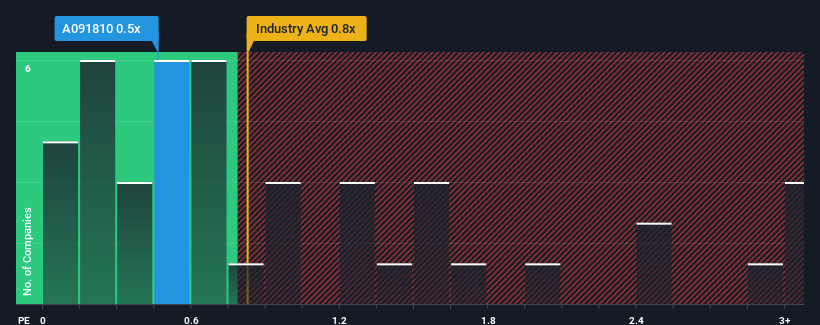- South Korea
- /
- Airlines
- /
- KOSE:A091810
There's Reason For Concern Over T'Way Air Co., Ltd.'s (KRX:091810) Price
It's not a stretch to say that T'Way Air Co., Ltd.'s (KRX:091810) price-to-sales (or "P/S") ratio of 0.5x seems quite "middle-of-the-road" for Airlines companies in Korea, seeing as it matches the P/S ratio of the wider industry. Although, it's not wise to simply ignore the P/S without explanation as investors may be disregarding a distinct opportunity or a costly mistake.
View our latest analysis for T'Way Air

How Has T'Way Air Performed Recently?
With revenue growth that's superior to most other companies of late, T'Way Air has been doing relatively well. Perhaps the market is expecting this level of performance to taper off, keeping the P/S from soaring. If you like the company, you'd be hoping this isn't the case so that you could potentially pick up some stock while it's not quite in favour.
Want the full picture on analyst estimates for the company? Then our free report on T'Way Air will help you uncover what's on the horizon.How Is T'Way Air's Revenue Growth Trending?
The only time you'd be comfortable seeing a P/S like T'Way Air's is when the company's growth is tracking the industry closely.
Taking a look back first, we see that the company grew revenue by an impressive 157% last year. The latest three year period has also seen an incredible overall rise in revenue, aided by its incredible short-term performance. Therefore, it's fair to say the revenue growth recently has been superb for the company.
Shifting to the future, estimates from the seven analysts covering the company suggest revenue should grow by 5.9% each year over the next three years. That's shaping up to be materially lower than the 11% per year growth forecast for the broader industry.
With this information, we find it interesting that T'Way Air is trading at a fairly similar P/S compared to the industry. Apparently many investors in the company are less bearish than analysts indicate and aren't willing to let go of their stock right now. Maintaining these prices will be difficult to achieve as this level of revenue growth is likely to weigh down the shares eventually.
What Does T'Way Air's P/S Mean For Investors?
We'd say the price-to-sales ratio's power isn't primarily as a valuation instrument but rather to gauge current investor sentiment and future expectations.
Our look at the analysts forecasts of T'Way Air's revenue prospects has shown that its inferior revenue outlook isn't negatively impacting its P/S as much as we would have predicted. When we see companies with a relatively weaker revenue outlook compared to the industry, we suspect the share price is at risk of declining, sending the moderate P/S lower. A positive change is needed in order to justify the current price-to-sales ratio.
We don't want to rain on the parade too much, but we did also find 2 warning signs for T'Way Air (1 is a bit unpleasant!) that you need to be mindful of.
If companies with solid past earnings growth is up your alley, you may wish to see this free collection of other companies with strong earnings growth and low P/E ratios.
Valuation is complex, but we're here to simplify it.
Discover if T'Way Air might be undervalued or overvalued with our detailed analysis, featuring fair value estimates, potential risks, dividends, insider trades, and its financial condition.
Access Free AnalysisHave feedback on this article? Concerned about the content? Get in touch with us directly. Alternatively, email editorial-team (at) simplywallst.com.
This article by Simply Wall St is general in nature. We provide commentary based on historical data and analyst forecasts only using an unbiased methodology and our articles are not intended to be financial advice. It does not constitute a recommendation to buy or sell any stock, and does not take account of your objectives, or your financial situation. We aim to bring you long-term focused analysis driven by fundamental data. Note that our analysis may not factor in the latest price-sensitive company announcements or qualitative material. Simply Wall St has no position in any stocks mentioned.
About KOSE:A091810
T'Way Air
Provides air transportation services in South Korea and internationally.
High growth potential and good value.
Market Insights
Community Narratives



